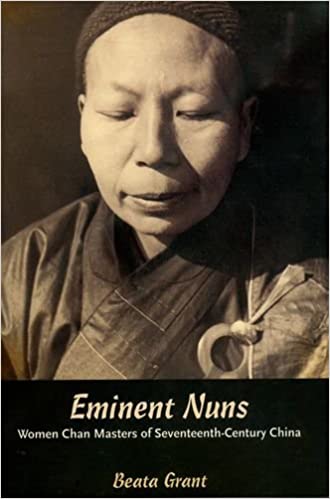ZEN MESTEREK ZEN MASTERS
« Zen főoldal
« vissza a Terebess Online nyitólapjára

Beata Grant (1954-)
Chinese name: 管佩達
https://wustl.academia.edu/BeataGrant
https://aatk.org/www/html/2010WUSTL/files/ealc/people/cv/Beata%20Grant%20CV%202012.pdf
Books by Beata Grant
![Daughters of Emptiness: Poems of Chinese Buddhist Nuns by [Beata Grant]](daughters.jpg)
PDF: Daughters of Emptiness: poems of Chinese Buddhist nuns, 2003
POEMS
SIX DYNASTIES (220–581)
Huixu
SUI AND TANG DYNASTIES (581–907)
Fayuan
Haiyin
Plum Blossom Nun
SONG DYNASTY (960–1279)
Miaozong
Zhengjue
Benming
Zhenru
Zuqin
Deying
Zhitong
Fahai
YUAN DYNASTY (1260–1368)
Miaozhan
EARLY AND MID-MING DYNASTY (1368–1600)
Wulian
Jueqing
One-Eyed Jingang
Jixing
Wuwei
LATE MING AND EARLY QING DYNASTY (1600–1750)
Daoyuan
Shenyi
Zaisheng
Jingwei
Chaoyi
Jingming
Xinggang
Yikui
Jingnuo
Xingche
Jifu
Jizong
Yinyue
Mingxiu
Mingben
Chaoyan
Yuanduan
Miaohui
Shiyan
Wanxian
Kedu
SECOND HALF OF THE QING DYNASTY (1750–1911)
Jizhu
Ziyong
Daoqian
Yinhui
Wuwo
Wuqing
Lianghai
Dawu
Longlian

PDF: Eminent Nuns: Women Chan Masters of Seventeenth-Century China, 2009
1. Setting the Stage: Seventeenth-Century Texts and Contexts / 1
2. Images of Nuns in the Writings of Seventeenth-Century Monks / 17
3. The Making of a Woman Chan Master: Qiyuan Xinggang / 37
4. Qiyuan Xinggang as Abbess, Dharma Teacher, and Religious Exemplar / 58
5. Passing on the Lamp: The Dharma Successors of Qiyuan Xinggang / 77
6. From Hengzhou to Hangzhou: 繼總行徹 Jizong Xingche (1606-?) / 107-129
7. From Wise Mother to Chan Master: Baochi Jizong / 130 寳持繼總 Baochi Jizong
8. Reviving the Worlds of Literary Chan: Zukui Jifu / 146 祖揆繼符 Zukui Jifu
9. From Beijing to Jiangnan: Ziyong Chengru / 165
![Zen Echoes: Classic Koans with Verse Commentaries by Three Female Chan Masters by [Beata Grant, Susan Moon]](echoes.jpg)
PDF: Zen Echoes: Classic Koans with Verse Commentaries by Three Female Zen Masters, 2017
This is a translation of a work that in Chinese is titled Songgu hexiang ji
頌 古合響集 or The Concordant Sounds Collection of Verse Commentaries.
Verse commentaries, or songgu 頌古, are poems inspired by stories or
kōans about buddhas, bodhisattvas, and above all, the great Chan (Zen)
masters of the classical period. They were composed primarily by Chan
masters, the vast majority of whom historically have been male. The verses
in this collection, however, are unique in that they were composed by three
female Chan masters, Chan master Miaozong 妙總 (1095–1170)*
and Chan Masters Baochi 寶持 and Zukui 祖揆 from the seventeenth.*Chan Buddhist masters normally have several names. Miaozong, for example, is also referred to as
Wuzhuo Miaozong 無著妙總 or Zeshou Miaozong 資壽妙總; Baochi as Baochi Jizong 寶持濟總 or
Baochi Xuanzong 寶持玄總; and Zukui as Zukui Jifu 祖揆濟符. In order to avoid confusion, I have
chosen to refer to them in this book simply as Miaozong, Baochi, and Zukui.The Text of THE CONCORDANT SOUNDS COLLECTION OF VERSE COMMENTARIES
Preface by Layman Zhang Dayuan 張大圓 (1589–1669)
THE CASES AND VERSES
Case 1 The World-Honored One Ascends the Seat
Case 2 A Non-Buddhist Achieves Realization
Case 3 A Woman Comes Out of Samadhi
Case 4 Aṅgulimāla and the Difficult Delivery
Case 5 The Mind That Emerges from the Empty Void
Case 6 Mañjuśrī Asks Vimalakīrti about Nonduality
Case 7 A Monk Asks Dongshan about Nirvana
Case 8 The World-Honored One Holds Up a Flower
Case 9 Bodhidharma’s Sandal
Case 10 Bodhidharma Pacifies Huike’s Mind
Case 11 The Fifth Patriarch Is Entrusted with the Dharma
Case 12 The National Teacher Calls Out Three Times
Case 13 Mazu’s Deafening Shouts
Case 14 Baizhang’s Fox
Case 15 Not Mind, Not Buddha
Case 16 Nanquan Kills the Cat
Case 17 Nanquan’s Circle
Case 18 Layman Pang’s Awakening
Case 19 Daowu Sings Out Loudly
Case 20 Jiashan’s Awakening
Case 21 The Real Buddha Sits Within
Case 22 Zhaozhou Checks Out the Old Woman
Case 23 Zhaozhou’s “Go and Wash Your Bowl”
Case 24 Does a Dog Have Buddha Nature?
Case 25 Zhaozhou Tests Two Hermits
Case 26 Linji’s Shout
Case 27 The True Man Without Rank
Case 28 Linji’s Host and Guest
Case 29 Xuefeng’s Gobblers of Dregs
Case 30 Deshan’s Blows
Case 31 Xinghua Levies a Penalty
Case 32 Chen Cao Checks Out the Monks
Case 33 Yantou the Ferryman
Case 34 Xuefeng’s Turtle-Nosed Snake
Case 35 Xuefeng’s Twenty Blows
Case 36 Lan’an’s Being and Nonbeing
Case 37 Bajiao’s Staff
Case 38 Baofu’s Unpolished Mind
Case 39 Every Day Is a Good Day
Case 40 Chen Cao Asks about the Teachings
Case 41 Fayan’s Fish-Drum
Case 42 Fried Sesame Cakes
Case 43 Dahui Holds Up a Bamboo Whisk
PDF: Mount Lu Revisited: Buddhism in the Life and Writings of Su Shih (1037-1107)
University of Hawaii's Press, 1994
Papers
PDF: Female Holder of the Lineage: Linji Chan Master 祇園行剛 Zhiyuan Xinggang (1597-1654)
Late Imperial China, 17.2 (1996) 51-76PDF: 大丈夫 Da Zhangfu: The Gendered Rhetoric of Heroism and Equality in Seventeenth-Century Chan Buddhist Discourse Records
Nan Nü 10 (2008) 177-211PDF: Writing Oneself into the Tradition: The Autobiographical Sermon of Chan Master Jigong Xingche (b.1606)
in: Gendering Chinese Religion: Subject, Identity, and Body, SUNY Press, 2014. pp. 47-69PDF: Women and Gender in the Discourse Records of Seventeenth-Century Sichuanese Chan Masters: 鐵壁慧機 Tiebi Huiji (1603–1668) and 破山海明 Poshan Haiming (1597–1666)
The Chinese Historical Review, 22:1, 52-71, May 2015PDF: Chan Friends: Poetic Exchanges between Gentry Women and Buddhist Nuns in Seventeenth-Century China
by Beata Grant
Chapter Seven in: The inner quarters and beyond : women writers from Ming through Qing / edited by Grace Fong and Ellen Widmer. Brill, 2010. pp. 215-262.PDF: Ch. 18. Gender
by Beata Grant
in: Randall Nadeau, ed. The Wiley-Blackwell Companion to Chinese Religions. Oxford: Blackwell, 2012. pp. 397-418.